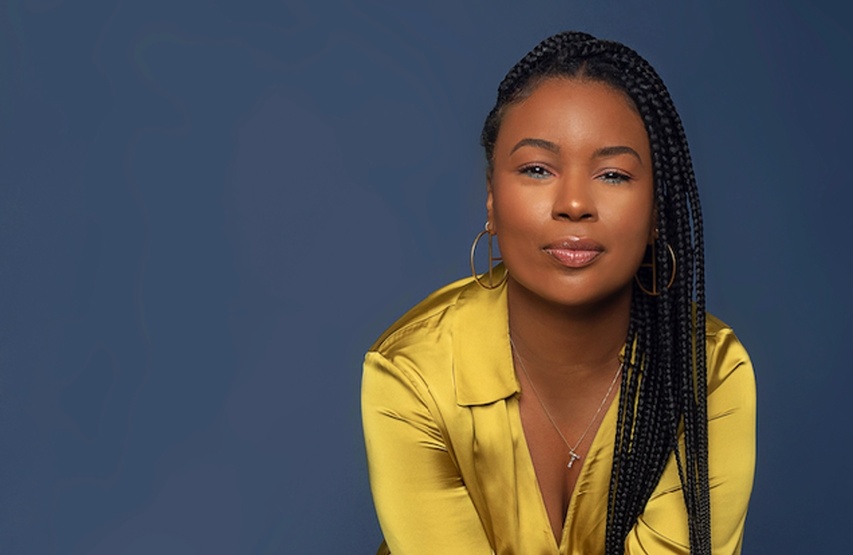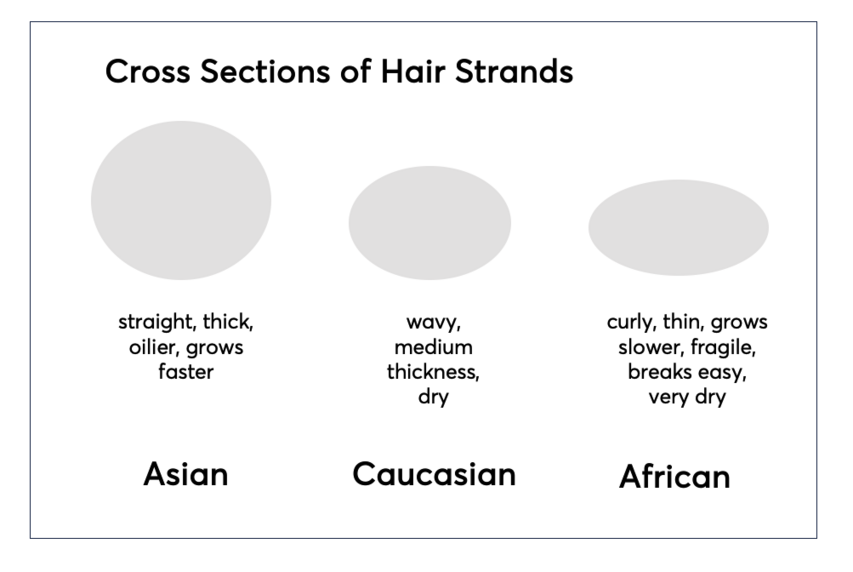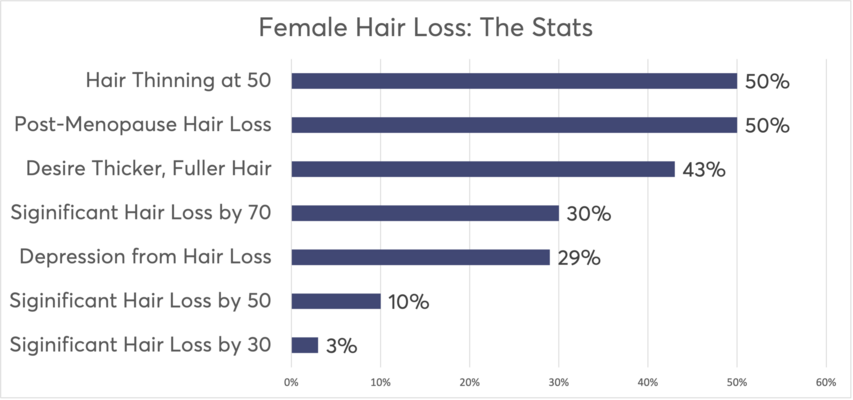Hair loss in black women

50% of women will experience visible hair thinning by age 50. Hair thinning tends to be more common in Afro-American women. Black women are particularly prone to certain forms of hair loss, and two-thirds will notice hair thinning by age 50. A recent study examining the causes and symptoms of hair loss in young people of color found that hair thinning was frequently accompanied by scalp pain, redness, tenderness, itching, scarring, and flaking. So, what are the most common causes of hair loss in black women? How can you stop hair thinning and regrow healthy, beautiful hair?
What causes hair loss in black women?
Traction alopecia and central centrifugal cicatricial alopecia are two of the most common hair loss conditions that affect black women. Other factors are genetic hair thinning that comes with age, postpartum hair loss after giving birth, and hair loss caused by excessive stress or inadequate diet.
The differences between hair strands from various ethnic backgrounds are remarkable, particularly when comparing Asian, Caucasian, and African hair types. Asian and Caucasian hair strands tend to have a more rounded cross-sectional shape. This round structure often results in hair that is generally stronger and less prone to breakage. Additionally, these hair types may have a higher capacity for retaining moisture, making them less susceptible to dryness.
On the other hand, African hair strands are typically flatter and thinner in cross-section. This unique structure contributes to its sensitivity and fragility. The flat, thin shape makes African hair more susceptible to dryness, breakage, and damage, requiring specialized care to maintain its health.

Traction alopecia
Traction alopecia is caused by hair frequently being pulled too tight, which causes inflammation in the follicle. Extensions, weaves, dreadlocks, cornrows, tight ponytails, and hair braiding can all contribute to traction alopecia. In addition to tight hairstyles, styling your hair with chemicals or heat can further contribute to this form of hair loss.
Early signs of traction alopecia include small, white bumps around the hairline and side of the scalp, and you'll gradually notice more hair loss in this area. Thankfully, traction alopecia can be reversed if you intervene quickly enough, but it can lead to permanent hair loss if left untreated. The best treatment for traction alopecia is stopping the behaviors that cause it – we'll talk more about that below.
Central centrifugal cicatricial alopecia (CCCA)
Central centrifugal cicatricial alopecia (or CCCA) is another form of hair loss that primarily affects black women, particularly around middle age. The exact cause of this type of hair loss – a form of scarring alopecia – is unknown. Still, it is believed it may be related to genetics, fungal or bacterial infections, or autoimmune diseases. With CCCA, the loss typically begins around the mid-scalp, gradually extending outward. Some people with CCCA may also experience itching, burning, and tenderness in the affected area.
CCCA can permanently damage hair follicles, which means they won't be able to grow new hair. This means it's essential to meet with a dermatologist to determine whether your thinning hair is related to CCCA (or another type of hair loss) and develop a hair care and treatment plan to stop the damage. Treatment may include topical steroids and/or antibiotics (both topical and systemic).

Hair loss in black women - additional factors
Black hair is more susceptible to thinning. Curly hair is more fragile, as the bends are more likely to experience breakage. Black women generally have a lower hair density, meaning fewer hair follicles. This can make areas with sparse hair more visible, particularly when natural hair is treated with chemical relaxers.
African-American hair is drier and more fragile. The unique texture of black hair limits the moisture that the hair can hold. Because of the curly nature of the hair, the natural hair oil produced in the scalp does not get to the entire length of the hair strands, resulting in fragile hair shafts that are difficult to manage and break easily. To avoid hair breakage, black women should wash their hair no more than once or twice a week, followed by a conditioner.
Alkaline shampoos and conditioners with a pH > 6 open the hair shaft cuticles, increase the hair's porosity and cause more dryness and frizz. To reduce hair dryness and frizz, you should always look for pH-balanced shampoos and conditioners.
What can Black women do to stop hair loss?
Women can do a few things to stop their hair loss in its tracks and promote new hair growth. It is important to note that you should first be aware of what is causing your hair loss since many factors can contribute to thinning hair. Once you know what is leading to your hair loss, you can work with a medical professional to create an effective treatment plan that targets the root cause and gets your hair back on track!
Reassess your hairstyling routine.
Limiting your use of any damaging hairstyles or chemical treatments is essential. The most effective way to stop this type of hair loss is to go natural without styling your hair in tight styles (braids, cornrows, high buns, ponytails, etc.), using weaves or extensions, or treating it with chemical relaxers or hot tools. It's also best to avoid dye, which can weaken your hair – at least as you wait for your hair to regain strength.
If you choose to wear a weave or extensions, a good option is to give your hair a break by wearing them for a certain amount of time and then going natural for that same amount of time (or longer). Those who get dreadlocks or braids can ask their hairstylist to style them looser to minimize pulling.
For those who use chemical relaxers, try extending the style as long as possible (a minimum of eight weeks) to give your hair ample time to rest between treatments. Keeping your hair moisturized with oils and conditioning treatments is key to making this style last.
Ensure you're wearing wigs properly. You might think that wigs are the safest option since they protect the hair, but when worn improperly, they can do more harm than good, causing breakage and pulling on the hair. In addition to wearing the correct size wig (a bad fit can lead to breakage), it's best to avoid using glues, as they can block follicles. Opt for a wig gripper instead. Additionally, you'll want to ensure you're regularly washing your wig, as bacteria from the wig can negatively affect hair follicles.
Apply Minoxidil 2% or a plant-based DHT-blocking hair regrowth serum
Having a healthy scalp is essential to regrow new hair. A healthier scalp can be achieved with the right combination of hair treatment serum, a hair regrowth shampoo, and oral supplements that will replenish micronutrients and trigger hair regrowth. Scalp treatment serum can be medicated (based on minoxidil) or plant-based.
Use a DHT-blocking hair regrowth shampoo.
Using the correct shampoo is essential for healthy hair. Food treatment shampoo will include both DHT blockers that reactivate dormant hair follicles and cause them to go into active growing shapes (anagen) together with proteins and oils that will make your hair smoother, shinier, and easier to manage.
Take hair regrowth supplements and collagen peptides.
Optional results require treatment from the inside out. Hair regrowth supplements replenish the vitamins, minerals, and amino acids necessary for hair follicles to grow new hair. Specially formulated collagen peptides are another excellent addition to your hair regrowth routine, providing the building blocks needed to build stronger and more beautiful hair. Check this link for more info on collagen peptides.
Best scalp treatment serum for hair loss in black women
Best oral supplements to help hair regrowth hair loss in black women
References:
- Evaluation of Hair Density in Different Ethnicities in a Healthy American Population Using Quantitative Trichoscopic Analysis
- Central Centrifugal Cicatricial Alopecia
- Black women's hair: The primary scalp dermatoses and aesthetic practices in women of African ethnicity
- Traction alopecia: The root of the problem
Find the most effective hair growth products for you by taking the free hair assessment.



